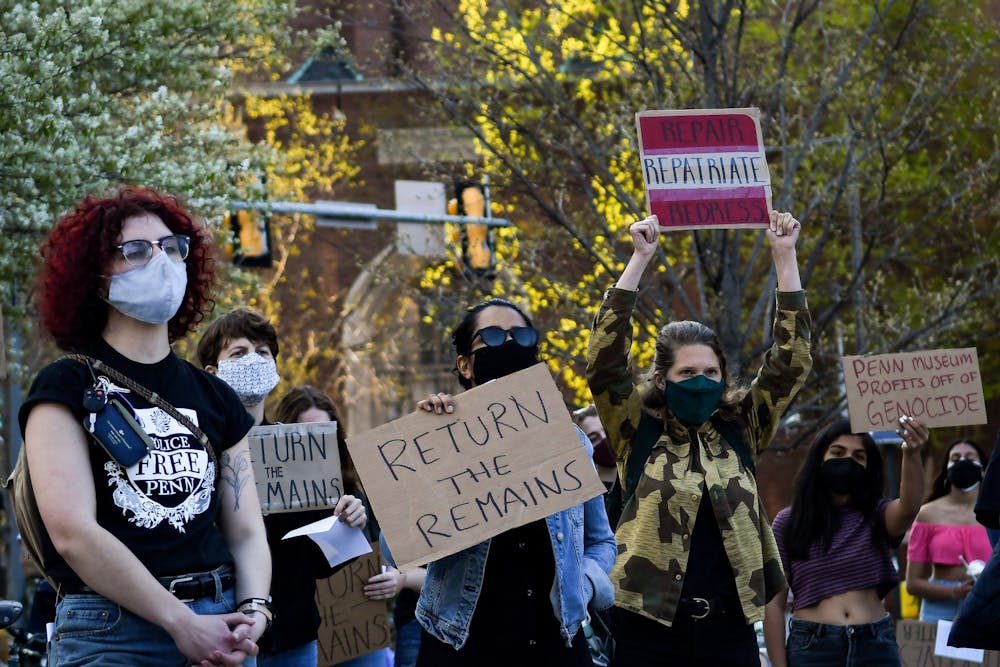
Students and local residents demanded the complete repatriation of the Morton Cranial Collection during a protest on April 8.
Credit: Sukhmani KaurPenn Museum announced plans for the repatriation of the widely criticized Morton Cranial Collection, a collection of about 1,000 crania that includes crania from individuals who were enslaved.
Penn Museum and the University issued an apology for their "unethical possession of human remains" in a Monday evening statement, adding that repatriation is a step toward "repair for the racist and colonial practices that were integral to the formation of these collections." The plan is based on an April 8 report by the Morton Collection Committee, a team of students, Penn Museum leadership, staff, and anthropologists, outlining recommendations for repatriation.
The announcement comes as the collection faces condemnation from students and local residents, many of whom demanded repatriation. Penn Museum removed the collection from public view last summer in response to criticism, though it was still accessible for student research.
“An initial phase of rigorous evaluation was critical for ensuring an ethical and respectful process around repair. As we move into implementation, the Museum will immediately begin the process of working with local communities to understand their wishes for repatriation," Penn Museum Williams Director Christopher Wood said in the statement.
More than 50 students and local residents protested Penn Museum's continued possession of the Morton Collection last week, demanding complete repatriation and a halt to the circulation of data collected from the skulls. The protest, organized by Police Free Penn and Black Lives Matter Philly, took place after a February 2021 report authored by School of Arts and Sciences Ph.D. sixth-year Paul Wolff Mitchell found that the Morton cranial collection holds the skulls of 14 Black Philadelphians, which were robbed from their graves in the 19th century.
The Morton Collection is the work of Samuel George Morton, an 1820 Perelman School of Medicine graduate who used the skulls of people who were enslaved to argue that there are inherent differences between the brains of people of different races. Morton used the findings from his collection to justify slavery and is known as a “founding father of scientific racism,” according to Discover Magazine.
During the Penn & Slavery Project’s 2019 symposium, students presented findings that the collection includes 53 crania belonging to individuals who were enslaved from Havana, and two crania belonging to Americans who were enslaved.
The Morton Collection Committee urged Penn Museum to acknowledge that the collection contains human remains that were collected unethically, return ancestors to their communities of origin whenever possible, and apologize for its possession and treatment of unethically obtained ancestors, among other recommendations.
Penn Museum will establish a committee to explore options for reburial in a historically Black Philadelphia cemetery in collaboration with Penn’s offices of Social Equity and Community, Government and Community Affairs, the University Chaplain, General Counsel, and others, per the Morton Collection Committee's recommendation.
Community consultation will be considered at every stage of the repatriation and reburial process, according to the press release. The process will be modeled after Penn Museum's 1990 Native American Graves Protection and Repatriation Act, which has been used to return relevant materials, including some from the Morton Collection, to Indigenous communities.
Penn Museum is also set to collaborate with SAS to create a new full-time faculty position for a BIPOC bioanthropologist, per the committee's recommendation. The faculty member will have expertise in the analysis of human remains, as well as a record of advocacy for Black and Indigenous matters in repatriation requests. This person will also serve as a Penn Museum curator in addition to serving as a faculty member in the Department of Anthropology.
Penn Museum will reassess its practices of collecting, stewarding, displaying, and researching human remains, Woods said in the press release.
“There is no 'one-size-fits-all' approach to handling repatriation and reburial in any circumstance,” Woods said in the press release. “Each case is unique and deserves its own consideration. This is incredibly sensitive work. And while we all desire to see the remains of these individuals reunited with their ancestral communities as quickly as possible, it is essential not to rush but to proceed with the utmost care and diligence. As we confront a legacy of racism and colonialism, it is our moral imperative to do so.”
The Daily Pennsylvanian is an independent, student-run newspaper. Please consider making a donation to support the coverage that shapes the University. Your generosity ensures a future of strong journalism at Penn.
Donate




